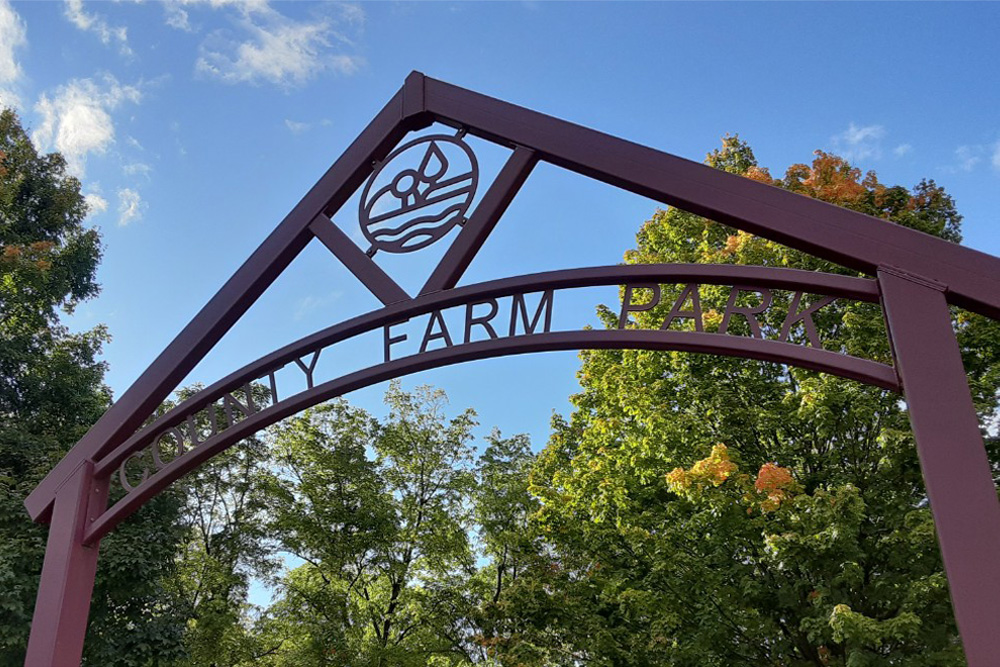

The sign at the entrance of Ann Arbor’s County Farm Park. With 81 mixed annual/perennial plots at the park, it is Project Grow’s largest site. Debra Destefani | Washtenaw Voice
By Debra Destefani
Deputy Editor
The chill of fall is in the air and the plants that produce the fresh flavors of summer are quickly deteriorating. Squash, melons and tender greens are gone, their place taken by hardier raspberries and peppers. The community and coordinators that tend to the Project Grow gardens at the Nelson Meade County Farm Park are nearing the end of their busy and uncertain season.
COVID-19 created complications for operations in several ways at the gardens, but mother nature doesn’t wait for humanity to catch up. More garden plots have been rented than in previous years, and now they must be winterized.
At the beginning of the growing season–which coincided with Gov. Whitmer closing non-essential businesses–gardens such as the one at County Farm Park faced uncertain times. Nurseries and outdoor supply stores were temporarily shut down, unsure of when they would be allowed to reopen.
Kirk Jones, managing director of Project Grow, believed that a mixture of panic and free time resulting from the stay at home orders lead to higher participation in the community garden compared to other years. According to Jones, this isn’t the first time people turned to gardening in the face of uncertainty.
“That happened during the great recession too, maybe because people were unemployed and had time, but maybe a little paranoid about food. I understand it,” said Jones.
Project Grow has over twenty locations around Ann Arbor. At County Farm Park, a full plot rental costs $130 for the season and a half plot $80. The prices are going up next year for the first time in ten years, a change that was made because maintenance and administrative costs have risen.
In addition to providing ample garden space, Project Grow also hosted in-person classes, but COVID changed procedures and moved classes online to Zoom. Some events, such as the yearly heirloom tomato tasting, had to be cancelled altogether.
Sharon Fay, one of the site coordinators, felt that this year was missing some of the “community spirit” that the garden had in previous years.
“We used to have work parties and get together for a snack afterwards and get to meet people. It would usually be about five to 15 people, and at the end of the year we would have a big grill out, but that has changed,” said Fay.
Even without the typical work parties, members of the community found respite tending to their gardens.
Dan Crane, a law professor at the University of Michigan, has had a plot at County Farm Park for seven years. Crane explained that he contracted COVID earlier in the season, which kept him and his two children Lucian, 4, and Pascal, 11, away from the garden for a while. After he beat the virus and his quarantine ended, they found that gardening was one of the safer activities that still allowed them to feel connected to their community.
“My favorite thing is that families with kids wander through. We let people come and bond by sharing food. We do this to show our kids where food comes from and we love sharing that with the people who wander through,” said Crane.
“Our peppers are still talking to us, and there are sweet potatoes in the ground. We’ll have asparagus next spring.”
Sunflowers are bowed, hanging heavy from their seeded heads. Dahlias are in their full display of bloom, an escape from fall’s brown grass and leaves. Tomatoes left on the vine are either overripe and rotting, or green with no hope of turning red, now only useful in recipes such as piccalilli and fried green tomatoes.
With winter quickly approaching, the gardens are going to sleep. But for Fay, the work isn’t over.
“Us gardeners are always thinking ahead to next season. There’s always next year.”
Summer semester students will be among first to see full shift Alice McGuire | Deputy…
Experts share insights on how to file, education credits Yana McGuire | Staff Writer U.S.…
Teresa Quinones | Contributor Eric Jiskra vividly remembers sitting in the passenger seat of his…
Beck Elandt | Staff Writer Tariffs announced in early February have been in effect since…
How cost of living compares for 2-year, 4-year students Beck Elandt | Staff Writer When…
Lily Cole and Inayah Amir Bey | The Washtenaw Voice Question: What’s your dream vacation…